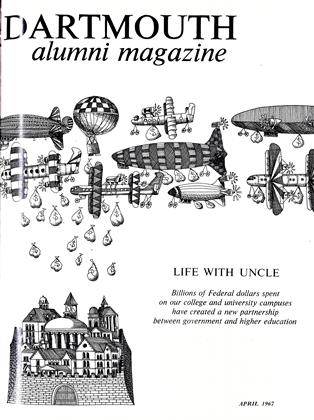By Professor of Belles Lettres AlexanderLaing '25. New York: G. P. Putnam'sSons, 1966. 224 pp. $3.95.
This delightful book is as much about America's great sailing ships and the men who fashioned and sailed them as Frost's poem "Birches" is about boys and trees. Clipper Ships and Their Makers is a testimony to the human spirit. Fittingly, Professor Laing's book is dedicated to poet Philip Booth '47.
This is not to say that Professor Laing neglects to tell the exciting story of the development of America's sailing ships from blockade-running in the Revolution to the great days when clipper ships set records for speed to Europe, California, and the Far East - or of the men responsible for this development. He does. His research into the lives of the builders and into the details of construction - and the times in which these clippers evolved — has been thorough. He knows these great ships from bow to stern. But more importantly he shares his insights into the "why?" such "half poetry" (as he describes clipper ships) could have come into being.
But let Professor Laing speak for himself, as he does in his introductory chapter:
"Democracy is a faith. If we are ever to conquer the world with our faith we can be helped greatly by the mechanical products of American genius. But the most beautiful of our new Space Age clippers can merely bring us to the planets. Our success when we get there will depend upon the ideas that we have carried with us. The universe will belong to those who have the best vision to capture the imagination of all beings.
"That is one reason why, in this book, the ideas that produced the clipper ships are more important than the ships themselves or their performances."
The ideas are here, and the background for the ideas. The author portrays a young nation, fresh, vigorous, and receptive to the bold and the experimental, through its sailing ships and its sailing men. He introduces you through colorful biographical sections to men like Captain Nat Palmer, John Willis Griffiths, and Donald McKay - the men of imagination and daring in design to whom the merchants turned for the fast ships they needed to compete against each other and the established maritime powers.
The book clearly illustrates the author's contention that "The spirit of a people reveals itself plainly in their handiwork." Although published for the younger reader, Clipper Ships and Their Makers is enjoyable and informative reading for all.
 View Full Issue
View Full Issue
More From This Issue
-
 Feature
FeatureLife with Uncle
April 1967 -
 Feature
FeatureDICK'S HOUSE
April 1967 -
 Feature
FeatureUNCLE SAM AT DARTMOUTH
April 1967 By C. E. W. -
 Article
ArticleThe Undergraduate Chair
April 1967 By ART HAUPT '67 -
 Article
ArticleEloquence at Gettysburg and Daniel Webster
April 1967 By EARL W. WILEY '08 -
 Class Notes
Class Notes1920
April 1967 By MACOMBER, JOHN s. MAYER
Books
-
 Books
BooksROBERT SALMON: PAINTER OF SHIP & SHORE.
DECEMBER 1971 By ALEXANDER LAING '25 -
 Books
BooksTHE FEMININE FIFTIES
June 1940 By Herbfrt F. West '22 -
 Books
BooksNOT FAR FROM THE JUNGLE.
January 1957 By JOHN FINCH -
 Books
BooksENGINEERING AND THE LIBERAL ARTS, A TECHNOLOGISTS GUIDE TO HISTORY, LITERATURE, PHILOSOPHY, ART, AND MUSIC.
JULY 1968 By ROBERT N. KREIDLER '51 -
 Books
BooksThe Forensics of War
MARCH | APRIL 2020 By Sean Plottner -
 Books
BooksEavesdropping
December 1975 By THOMAS S. SCOTT-CRAIG


